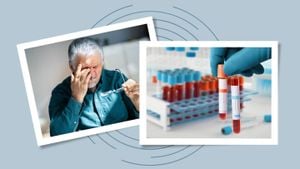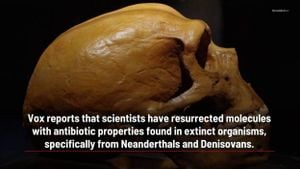Artificial intelligence has been making waves across numerous fields, but its latest triumph might just be one of the most important yet. An inspiring story out of the U.K. highlights how AI played a pivotal role in detecting breast cancer, where traditional screening methods had failed. This remarkable advancement not only showcases the immense potential of technology but also emphasizes the growing importance of incorporating AI within the healthcare sector.
A woman identified as Sheila Tooth is expressing her heartfelt gratitude after AI technology detected cancer cells during her routine screenings. According to reports, the cancerous cells were undetectable by human eyes, highlighting the limitations of conventional mammograms. Sheila stated, “I’m deeply grateful to the technology,” underscoring the lifesaving capabilities of AI.
Sheila’s case isn’t just isolated; it’s part of a larger trend where artificial intelligence systems are increasingly being integrated with medical imaging to improve diagnostic accuracy. Research indicates these AI advancements are frequently achieving higher precision rates compared to traditional methods. While the technology isn't expected to replace human radiologists anytime soon, it could significantly assist them by flagging potential concerns prior to expert evaluations.
According to experts, the AI systems are trained using vast datasets of medical scans. This training allows the software to recognize patterns indicative of cancer, some of which may remain obscured to human examination. With AI's efficiency at analyzing images, more patients like Sheila can receive life-saving early interventions, which are vitally important when battling diseases like cancer.
But Sheila Tooth's case embodies more than just individual success; it resonates with the pressing healthcare challenge of timely cancer detection. Experts agree early diagnosis is often linked to improved outcomes. With AI’s growing role, the medical community remains cautiously optimistic about reducing the rates of late-stage cancer diagnoses.
Interestingly, another revolutionary development emerged concurrently involving robotic surgery. Researchers at prestigious institutions such as Johns Hopkins and Stanford University have successfully programmed robots to perform complex surgical procedures by merely observing human surgeons. This groundbreaking method appears to open newly automated avenues for the medical field, showcasing yet another facet of how technology is redefining healthcare.
But the integration of artificial intelligence and robotics is garnering mixed reactions from the public, even among those within healthcare. Many professionals express excitement about the advancements AI brings, allowing them to focus their talents on patient care and more complex decision-making. Conversely, there are concerns about the over-reliance on machines to perform tasks traditionally handled by humans.
Katherine Waterston, known for her roles in films exploring technology's dark side, recently voiced her apprehensions about AI. “There’s the potential for incredible innovation and a real threat,” she remarked, calling for stringent regulations on such technology. Her words reflect societal fears about the rapid growth of AI capabilities and the potential consequences of such advancement.
Delving back to the medical front, advancements like Sheila's story may soon pave the way for new AI technologies to enter the healthcare sector, making routine screenings more effective and widely utilized. The medical community remains watchful, studying these technologies’ impact and efficacy as they become more widely established.
Meanwhile, key players such as Sam Altman, CEO of OpenAI, believe the effort is just beginning. Altman has lauded the promise AI holds across various sectors, particularly healthcare. He is optimistic about collaborating with current and future administrations to strengthen the United States’ AI infrastructure. He stated, “We must build the best AI infrastructure to support such advancements,” reinforcing the belief AI has the capability to propel healthcare innovations on the global stage.
The compelling intersection of AI and cancer detection continues to evolve. Sheila's transformative experience serves as both inspiration and encouragement for those advocating for AI integration within medical practices. While challenges remain, including regulatory concerns and ensuring consistent accuracy, technological advancements hint at invigorated strategies against one of humanity's most relentless foes.
Sheila Tooth's story not only informs about new technologies but also emphasizes the human element. There's something wonderfully compelling about depicting how AI can help save lives, capturing real stories of victory against cancer through innovation. The more health professionals and tech developers collaborate, the greater the potential for changing lives, one scan at a time.
AI technologies are now on the path to reshape cancer detection as we know it. Innovations such as these are not simply about algorithms and data; they are about individuals like Sheila who get to live fuller, healthier lives due to timely interventions. If we stay the course, the blend of AI technology and human care could very well start altering the narrative of cancer survival rates, leading to hope where there may have previously been despair.
The story of Sheila Tooth stands as proof of AI's life-affirming potential and signals the dawn of new possibilities within the healthcare domain. What does the next chapter look like? Only time will tell, but for now, we can take heart in knowing technology is working tirelessly to combat disease, opening doors to methods heretofore unimagined.



